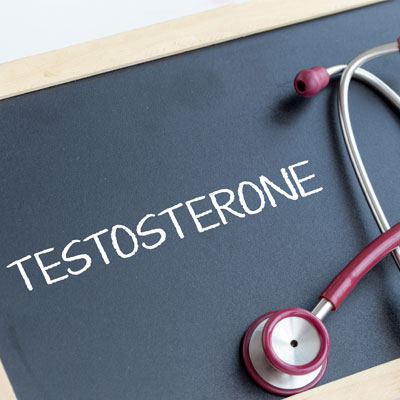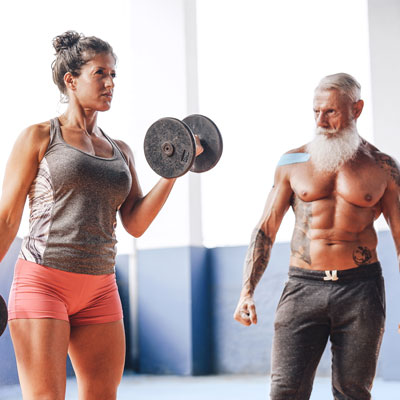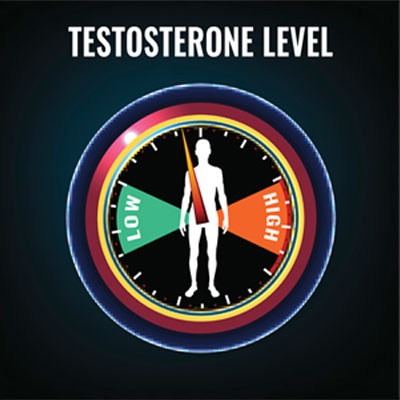Testosterone Hormone: What It Is and How It Affects You
Contents
- Why Do We Need Testosterone?
- Understanding How Testosterone Affects Men
- Understanding How Testosterone Affects Women
- How Is Testosterone Regulated in the Body?
- What Is a Testosterone Imbalance?
- What Happens If I Have Too Much Testosterone?
- What Happens if I Have Too Little Testosterone?
- What Are the Normal or Average Testosterone Levels in Men and Women?
- Understanding Low Testosterone Levels
- How Do We Test for Testosterone Levels?
- Is a Physical Examination Part of Testing for Low Testosterone?
- Testosterone Replacement Therapy
- After Testosterone Treatment

Why Do We Need Testosterone?
Testosterone in males is primarily responsible for boys maturing sexually and being able to produce sperm. It is also responsible for all of the “secondary sexual characteristics” we associate with the onset of puberty, such as a deepening voice, beard growth, etc.
As adults, in both men and women, testosterone is associated with sex drive or libido. It plays a vital role in muscle and bone growth as well. It has an impact on cognition and emotional wellbeing.
Testosterone also impacts how the body metabolizes or stores fat.
Understanding How Testosterone Affects Men
Testosterone is the most important male hormone. It affects everything in men from sperm production to libido. Male fetuses begin to produce testosterone in the womb, and testosterone levels increase throughout early life. In men they rise dramatically during puberty, peak during the late teen years, and then level off in the 20s. After age 35 or so, a man’s testosterone levels start to decrease regularly every year. Throughout a man’s life his testosterone levels impact:
- Strength and stamina
- Muscle tone and bone density
- Sex drive and sexual performance
- Fertility
- Cognition and mood states
Understanding How Testosterone Affects Women
While testosterone is a vital male hormone, women need and produce testosterone as well. A woman’s body makes only a fraction – about 1/10th to 1/20th — of the amount men do. However, it still plays an essential role for females.
In women, testosterone plays an important role in:
- bone health
- breast health
- fertility
- sex drive
- menstrual health
- vaginal health
Just as in men, women lose testosterone as they age. In fact, recent studies have shown that it is the loss of testosterone, and not estrogen, that accounts for most of the debilitating symptoms, such as hot flashes and night sweats, that we usually associate with menopause.
Your levels of testosterone tend to decrease as you age.
How Is Testosterone Regulated in the Body?
Testosterone is produced by the gonads. These are the testes in men and by the ovaries in women. A small quantity is also produced by the adrenal glands in both sexes.The testosterone level in your blood is regulated by the hypothalamus of the brain and pituitary gland. In response to hormonal signals from the hypothalamus, the pituitary gland produces other chemical signals.
Once produced, testosterone travels through the blood to be absorbed by your cells, and to perform its many critical functions.
The hypothalamus responds to rising and falling levels of testosterone in the blood and either slows or increases the production of testosterone as needed.
What Is a Testosterone Imbalance?
Hormones such as testosterone are your body’s chemical messengers. They stimulate or regulate all of the normal functions of your body. As such, they all need to exist in a proper balance, so that your body can operate in harmony. A hormone imbalance can occur in either direction. There are conditions that can cause your body to make too much, or too little testosterone.
In either case you are considered to have a “testosterone imbalance.” Each condition causes its own set of problems, and has its own unique kinds of treatments.
What Happens If I Have Too Much Testosterone?
Men and women can both have high testosterone, or a condition known as Trusted sourceHypogonadism and HypergonadismConcilioGo to sourcehypergonadism . It is far less common than low testosterone, and is usually caused by a disease state such as damage to, or a tumor of the adrenal glands. Men who have abused anabolic steroids to build strength and muscle, often experience the symptoms of high testosterone.
The signs and symptoms of high testosterone in men include:
- Early puberty, in young men
- A decreased sperm count
- Acne
- High libido
- Excessive “hairiness”
- High blood pressure
- High red blood cell count
- Increased risk-taking behaviors
- Aggression
In woman, signs of too much testosterone include:
- Excess body hair, specifically facial hair
- Hair loss
- Acne
- Enlarged clitoris
- Decreased breast size
- Deepening of the voice
- Increased muscle mass
What Happens if I Have Too Little Testosterone?
Since we know that testosterone levels decrease in both men and women as they age, too little testosterone, is much more common than too much. Low testosterone, or a testosterone deficiency, is when the body isn’t able to make enough testosterone to keep it above normal levels. Symptoms of low testosterone include:
- Low energy
- Weight gain, particularly increased belly fat
- Irritability
- Loss of muscle mass
- Cognitive difficulties
- Loss of libido or other sexual performance issues
You can have too much or too little testosterone, but too little, or “low testosterone” is far more common.
What Are the Normal or Average Testosterone Levels in Men and Women?
Testosterone exists in your body in two ways, “bound” testosterone which is testosterone that is tied to proteins, or “free testosterone,” which is the level of testosterone that is freely flowing in your blood stream. When doctors are evaluating your testosterone levels to diagnose low testosterone, they usually look at your total testosterone level.
The following chart illustrates the normal total testosterone levels for men and women by “Tanner Stage” and age. The Tanner Scale breaks down the observable signs of puberty into 5 stages, running from Stage I from about age 10 to Stage V at 15 for boys, and about age 8 to 15 for girls.
| Tanner Stage | Male Testosterone (ng/dL) | Female Testosterone (ng/dL) |
| I | <3 | <3−6 |
| II | <3−432 | <3−10 |
| III | 65−778 | <3−24 |
| IV | 180−763 | <3-27 |
| V | 188−882 | 5−38 |
| Adult Male | >18 y: 264-916 | |
| Adult Female | 20 to 49 y: 8−48 |
Understanding Low Testosterone Levels
If you have lower than normal testosterone levels per the chart above, it does not mean that you will necessarily be suffering from low testosterone. Everybody is different, and what may be a “normal” level for one person, may be low for another. The above normal levels are considered guidelines. If you fall below the normal range, your doctor will have to take other things into account. Your age, weight, symptoms and lifestyle, all need to be considered, before offering a diagnoses of low testosterone, and possibly recommending treatments.
How Do We Test for Testosterone Levels?
If your doctor suspects that you have low testosterone, he or she will most likely run a blood test for your total testosterone. The total testosterone test is a simple blood test, usually taken in the morning, when testosterone levels are at their highest.
Is a Physical Examination Part of Testing for Low Testosterone?
Yes, absolutely. A medical history, a physical exam, and a thorough evaluation of your symptoms are necessary, before a proper diagnosis of low testosterone can be made. If your lab work, and the results of your physical exam indicate that you do indeed have Low-T, you may be a candidate for testosterone replacement therapy.
Testosterone Replacement Therapy
As the name implies, testosterone replacement therapy can give you back what time and nature take away. Testosterone replacement therapy is usually prescribed as a course of daily injections, usually for six month initially.
The benefits of testosterone replacement therapy include:
- Increased strength and stamina
- Improved sexual function and increased sex drive
- Fat loss and improved muscle tone
- Improved cognition
- Improved mood
Testosterone replacement therapy can effectively treat testosterone imbalances or low testosterone.
After Testosterone Treatment
After your initial run of testosterone replacement therapy, you will be reevaluated to determine the next steps. You may need to continue, or simply have to implement a regimen of dietary, exercise, and other lifestyle changes, designed to help you keep the progress and improvements that were made while you were taking daily testosterone injections.
Now that you know a little bit more about why you need testosterone, and what can happen if you have low testosterone, why not take the first step to feeling younger and stronger and contact us today, and see if you may be a candidate for testosterone replacement therapy.
FAQ
What Is Testosterone?
Testosterone is one of your body’s most critical hormones.
Testosterone is an androgen or male hormone. In fact, it is the most important male hormone, but women's bodies make and need testosterone too. Testicles primarily make testosterone in men. Women's ovaries also make testosterone, though in much smaller amounts.
Why Do We Need Testosterone?
Testosterone in males is primarily responsible for boys maturing sexually and being able to produce sperm. It is also responsible for all of the “secondary sexual characteristics” we associate with the onset of puberty, such as a deepening voice, beard growth, etc.
As adults, in both men and women, testosterone is associated with sex drive or libido. It plays a vital role in muscle and bone growth as well. It has an impact on cognition and emotional wellbeing. Testosterone also impacts how the body metabolizes or stores fat.
What Is Low Testosterone?
Low testosterone in men is a condition in which the testes do not produce enough testosterone. There are several diseases and conditions that can cause low testosterone. However, the most common cause of Low-t is age-related testosterone loss.
As you grow older, your levels of testosterone decline. This natural decline starts after age 30 and continues at a rate of about 1% to 2% per year throughout your life. By the time you are over 40, most men will be feeling the negative impacts of low testosterone.
How Is Low Testosterone Treated?
Low testosterone is treated with testosterone replacement therapy. There are several forms of testosterone replacement. Low testosterone treatment can be given as topical gels and creams, subdermal pellets, skin patches, or testosterone injections. Our doctors have found testosterone injections to be the safest and most effective type of low testosterone treatment.
Testosterone injections are prescribed as different “esters.” Each “ester” is simply a different chemical form of testosterone. They differ only in their molecular structure. The most commonly prescribed esters used for the treatment of low testosterone are testosterone enanthate and testosterone cypionate.
What Exactly Is Testosterone?
Testosterone is a male hormone or androgen. Though it is a "male hormone," women's bodies make and need testosterone as well, although to a lesser degree than men's bodies. In men, the testicles primarily make testosterone. Women’s ovaries also make testosterone, though in much smaller amounts.
Is Testosterone Important After Puberty?
Yes absolutely. Testosterone is primarily responsible for all of the changes that occur at puberty, changing a boy into a man; sexual maturity, beard growth, deepening of the voice, etc. But even after puberty, testosterone continues to play a vital role in regulating many bodily processes, including sexual performance, cellular metabolism, and bone and muscle growth.
How Does Testosterone Work?
The testosterone level in your blood is regulated by the hypothalamus of the brain and pituitary gland. In response to hormonal signals from the hypothalamus, the pituitary gland produces other chemical signals. These then stimulate the gonads to produce and release testosterone.
Once produced, testosterone travels through the blood to be absorbed by your cells and to perform its many critical functions.
The hypothalamus responds to rising, and falling levels of testosterone in the blood and either slows or increases the production of testosterone as needed.
What Is Testosterone Deficiency and Why Does It Occur?
A testosterone deficiency is when your body is not making enough testosterone. There can be several reasons for a testosterone deficiency, also known as "low testosterone" or "hypogonadism," but the main cause is the decline in testosterone levels that occur as men age.
How Does Testosterone Affect Men?
Testosterone is the most important male hormone. It affects everything in men, from sperm production to libido. Male fetuses begin to produce testosterone in the womb, and testosterone levels increase throughout early life. In men, they rise dramatically during puberty, peak during the late teen years, and then level off in the 20s. After age 35 or so, a man's testosterone levels start to regularly decrease every year. Throughout a man's life, his testosterone levels impact:
- Strength and stamina
- Muscle tone and bone density
- Sex drive and sexual performance
- Fertility
- Cognition and mood states
How Does Testosterone Affect Women?
While testosterone is a vital male hormone, women need and produce testosterone as well. A woman’s body makes only a fraction - about 1/10th to 1/20th -- of the amount men do. However, it still plays an essential role for females. In women, testosterone plays an important role in:
- bone health
- breast health
- fertility
- sex drive
- menstrual health
- vaginal health
Just as in men, women lose testosterone as they age. In fact, recent studies have shown that it is the loss of testosterone, and not estrogen, that accounts for most of the debilitating symptoms, such as hot flashes and night sweats that we usually associate with menopause.
Does Testosterone Cause Erectile Dysfunction?
Testosterone does not directly cause erectile dysfunction, but there is a link between low testosterone and erectile dysfunction or ED. Men with low testosterone have ED more often than men with normal testosterone levels. This is because of the impact that low testosterone has on good blood flow and nitrous oxide production, both of which are needed to obtain and sustain an erection.
Does Low Testosterone Cause Other Health Problems?
Yes, low testosterone is related to many other health problems. Because low testosterone leads to a slower metabolism and loss of lean muscle, it increases your risk of obesity, diabetes, high blood pressure, and cardiovascular disease. Low testosterone also increases your risk of developing Alzheimer's disease and other cognitive issues.
What Is Total Testosterone and Free Testosterone?
Testosterone in the body exists as either “free” or “bound” testosterone. Most of the testosterone in your blood is attached to one of two proteins: albumin and sex hormone-binding globulin (SHBG). However, there is some testosterone in the bloodstream that is not attached to either albumin or SHBG. This is what doctors refer to as “free testosterone.” Total testosterone is your combination of “free” and “bound” testosterone.
Can Testosterone Be Taken in Pill Form?
Yes, there is an oral form of testosterone. However, our doctors have found testosterone injections to be the safest and most effective form of testosterone replacement.
What About Testosterone Gels and Creams?
Testosterone gels and creams are an option. However, injections are still preferable. There is a chance of cross-contamination affecting the health of women and children you come into contact with, and there are far fewer dosage options available in testosterone creams and gels than there are with testosterone injections
Does Testosterone Make You Aggressive?
No. The reports of “roid rage” you have heard about occur when men are abusing testosterone or using it illegally to build muscle or enhance athletic performance. When used as prescribed by your doctor, testosterone can actually reduce feelings of aggression and anxiety in men with low testosterone.
Does Testosterone Give You Energy?
Yes, because testosterone improves cellular metabolism or the way your body creates energy from the foods you eat – it can improve your energy level.
Does Testosterone Help to Burn Fat?
Yes! One of the main benefits of testosterone therapy is that it improves your body’s ability to burn fat and build lean muscle.
- Dr. Vineet Tyagi, MD, Dr. Michael Scordo, MD, Dr. Richard S. Yoon, MD, Frank A Liporace, MD, Loren Wissner Greene, MD, MA
- J. Bradley Layton, PhD, Christoph R. Meier, PhD, MSc, Julie L. Sharpless, MD, Til Stürmer, MD, PhD, Susan S. Jick, DSc, MPH, M. Alan Brookhart, PhD
- Dr Robert M. Coward MD, Culley C. Carson III, MD, FACS, FRCS
- James Roland and Dana Robinson Medically reviewed by Harshil Matta, DO
- Harrison Wein, Ph.D.
- Chris Iliades, MD, Medically Reviewed by Farrokh Sohrabi, MD
- Jayne Leonard, Medically reviewed by Debra Sullivan, Ph.D., MSN, R.N., CNE, COI
Revisiting the Role of Testosterone: Are We Missing Something?
Comparative Safety of Testosterone Dosage Forms
Testosterone replacement therapy after prostate cancer
Understanding How Testosterone Affects Men
The Myth of Too Much Testosterone
What causes high testosterone in women?








